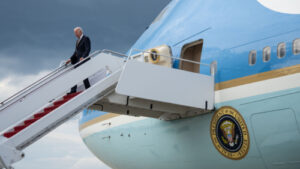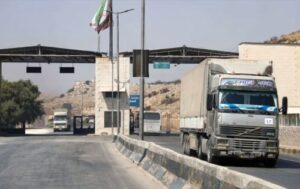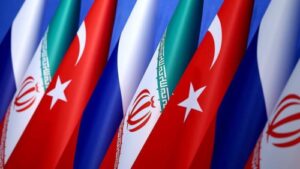
The National Interest Foundation Newsletter
Issue 153, July 14, 2022
Welcome to our NIF Newsletter. In this week’s headlines: U.S. President Biden embarks on his first trip to the Middle East since taking office last year, the U.N. Security Council agrees to extend Syrian cross-border humanitarian aid deliveries for another six months as agencieswarn of the detrimental impact that a failure to do so would have on millions of vulnerable civilians, peace and human rights activists express concern over indications that the Biden administration is weighing the possibility of lifting restrictions onoffensive arms sales to Saudi Arabia, and a trilateral meeting between Russia, Turkey, and Iran is slated to take place next week in Tehran.
Criticism of Biden’s Middle East Trip

Biden’s trip presents concerns related to the defense of human rights and press freedom given Israel and Saudi Arabia’s glaring abuses. (Photo from The New York Times)
U.S. President Biden Embarks on His First Trip to the Middle East Since Taking Office Last Year
This week, U.S. President Joe Biden traveled to the Middle East for the first time since taking office last year. The multi-stop trip has garnered considerable criticism, with Biden’s visits to Israel and Saudi Arabia drawing particular concerns regarding press freedom and the defense of human rights due to the two countries’ egregious violations in these areas. Overshadowing the trip are the killings of journalists Shireen Abu Akleh and Jamal Khashoggi, and the decision to meet with Israeli and Saudi officials despite growing outrage at flagrant human rights abuses like these has been scrutinized. A host of activists, lawmakers, and observers alike have urged President Biden to do more to hold those responsible for human rights violations accountable, including other detriments to peace and security in the region such as continued illegal Israeli settlements in the occupied West Bank. As some justifiably highlighted, concrete and lasting advancements cannot be achieved by legitimizing entities that engage in this type of damaging and abusive behavior.
Grave human rights violations including the heinous killings of journalists Shireen Abu Akleh and Jamal Khashoggi, at the hands of the very authorities that Biden is meeting with on his trip, cannot simply be pushed aside for the sake of geopolitical and strategic considerations. During his presidential campaign and lead up to taking office, Biden himself vowed to make human rights the center of his foreign policy, yet now, in the midst of a real moment to put this to action, he has failed to do so. The respective governments responsible for these blatantly unjust murders need to be held accountable, or it undermines all of the core values that the United States stands for. If the Biden administration continues down this path, it is turning its back on the defense of basic human rights, press freedom, democratic principles, and the rule of law. Biden seems to be aware of all of these fair criticisms, going as far as penning an opinion piece in The Washington Post due to all of the backlash he has received for the trip, however he continues to perform mental gymnastics in order to try and justify what is wrong.
President Biden’s Middle East trip has garnered little enthusiasm, with fewer than one-quarter of Americans approving of it in a recent University of Maryland poll. The survey also highlighted growing dissatisfaction with the governments of Israel and Saudi Arabia, with disapproval of the trip rising upon the mentioning of each. This indicates that the general population is becoming increasingly cognizant of their serious human rights abuses, which have come under even more intense magnification with high-profile incidents in recent years like the killings of Abu Akleh and Khashoggi. Rights and social justice activists lament that President Biden is willing to visit these countries and engage in normal relations, particularly at such a sensitive time and with heightened awareness of these major issues. They have outlined that Biden is indicating the administration is willing to sacrifice its core principles if it means being able to secure short-sighted achievements that do nothing in the way of helping bring about lasting peace and security.
Above all, the vital issues which must be adequately addressed as a precursor to any serious advancements in this process is Israel’s continued illegal occupation of Palestinian territory, the expansion of unlawful settlements, and discriminatory practices against Palestinians. Activists and U.S. lawmakers have pushed Biden to do more regarding the issue of settlement expansion because of the damaging role it plays in impeding substantial progress towards peace and security. In the lead up to his Middle East trip, 31 Congressmembers called on the president to use every diplomatic tool at his disposal to ensure that Israel does not further advance its troubling plans. With respect to its treatment of Palestinians, rights groups have increasingly criticized Israel’s policies and over the last several years, multiple reputable entities including Amnesty International, Human Rights Watch, and the United Nations have all accused Israel of apartheid practices.
Observers point out that engaging with Israeli officials in the absence of repercussions for continued illegal settlement projects and other human rights violations will only lead to more animosity and a sense of injustice, as has normalizing relations between Israel and several Arab nations without fair concessions towards Palestinians. All this serves to ultimately do is alienate Palestinians, and reduce hope in the ability to secure their basic rights and freedoms. In a similar manner, Biden meeting with Saudi authorities signals to them that the administration is willing to look the other way despite their alarming array of human rights abuses if geopolitical and short-sighted interests are on the table.
Syrian Cross-Border Humanitarian Aid

The Bab Al-Hawa Border Crossing is a critical humanitarian corridor that offers much-needed assistance to citizens in northwest Syria. (Photo from AFP)
The U.N. Security Council Agrees to Extend Syrian Cross-Border Humanitarian Aid Deliveries for Another Six Months as AgenciesWarn of the Detrimental Impact that a Failure to do so Would Have on Millions of Vulnerable Civilians
The United Nations Security Council has adopted a last-minute deal to extend the authorization of cross-border aid deliveries into northwest Syria for six months. The Bab Al-Hawa Border Crossing, a road reaching the region from Turkey, is an integral humanitarian aid corridor that allows food and other supplies to reach vulnerable civilians. The mandate had expired this past weekend after Russia used its veto power to block efforts to extend the authorization by a full year. In order to break the deadlock, a compromise was reached granting the mandate another six months, with the future option of lengthening it by the same amount of time. Turkey and others helped to push Russia to agree to the resolution, which is critical in providing food and medical supplies to the area. Aid agencies, non-governmental organizations (NGOs), and rights activists have stressed the importance of the extension, citing that the humanitarian situation in Syria would get considerably worse if this road was blocked. While the 6-month extension was ultimately just half of the desired 12-month renewal wanted by most parties involved, it is nevertheless a needed step to ensure that aid can still continue to flow into northwest Syria.
Observers and political officials have championed the midnight deal as a positive instance of multiple actors engaging in productive and persistent talks, the result of which averted exacerbating humanitarian suffering in a devastated region. Some optimistic analysts have even cited that this may be a sign of growing communication and collaboration to try and bring an end to the longstanding and brutal Syrian conflict. U.S. Ambassador to the United Nations, Linda Thomas-Greenfield, stated that “The humanitarian agreement we’ve reached here will literally save lives, but while the deal is undoubtfully critically important to ease Syrian suffering as a result of the war, it is by no means a long-term solution.”
The Syrian conflict has been one which, due to the array of rights abuses and a dire humanitarian crisis, has gained the attention of the international community, and particularly NGOs. These NGOs and human rights activists were quick to strongly condemn the initial refusal to extend the protected border crossing. Total refusal to extend it would have resulted in a serious deterioration of an already sensitive humanitarian situation in northwest Syria, where an estimated 4.4 million civilians are reliant upon the aid delivery services due to a lack of food and basic supplies. Apart from it being a moral consideration, if Russia was to block the crossing even at the modified resolution parameters, it would have been a grave violation of international law. Additionally, with that potential road corridor closure, all U.N. aid would have needed to go through the Assad regime which for understood reasons, lacks international trust to not interfere or mismanage it.
The midnight deal at the United Nations, with pressure from Turkey and diplomatic maneuvering from the United States, has positive implications with millions of Syrians getting much-needed humanitarian aid. Even as some have praised the diplomatic efforts though, there is still far more to be done in order to ensure that the road’s authorization is extended beyond the short-term 6-month deal recently approved by the U.N. Security Council. It is still deeply troubling that Russia wields a significant amount of control over the status of the humanitarian corridor. For long-lasting diplomatic triumphs regarding Syria, further attention and pressure on Russia and other Syrian-regime supporting entities is imperative to protect civilians who have been cruelly affected by the longstanding conflict.
Concern Regarding Saudi Arms Sales

There are fears that the lifting of restrictions on offensive arms sales to Saudi Arabia could lead to more death and destruction in Yemen. (Photo from AFP)
Peace and Human Rights Activists Express Concern over Indications that the Biden Administration is Weighing the Possibility of Lifting Restrictions onOffensive Arms Sales to Saudi Arabia
As a supplement to an already controversial trip to Saudi Arabia, there are indications that the Biden administration has been considering lifting the ban on U.S. sales of offensive weapons to Saudi Arabia. This is in direct contrast to Biden’s previous statements vowing to make Saudi Arabia an international “pariah” over its multitude of human rights violations and the heinous 2018 murder of Washington Post columnist Jamal Khashoggi. News that President Biden may lift the ban on “offensive” arms sales to Saudi Arabia has caused great concern among human rights and social justice activists. The Biden administration originally implemented restrictions early last year due to growing pressure over civilian casualties and the dire humanitarian crisis in Yemen. Saudi Arabia has played a destructive role in the Yemeni conflict, where an estimated 377,000 people have been killed, including tens of thousands of civilians as a result of the devastating Saudi-led bombing campaign. A Saudi blockade has also heavily contributed to what is widely acknowledged as the world’s worst humanitarian crisis, with hundreds of thousands more dying from food insecurity and a lack of access to health services.
Many human rights activists are worried that the lifting of restrictions on offensive arms sales to Saudi Arabia will lead to increased death and draw out the conflict in Yemen. One of the weapons that would be allowed to be sold is the F-35, a U.S.-made state-of-the-art joint strike fighter. Opening the door for the sale of these types of weapons to Saudi Arabia could worsen an already dire humanitarian situation in Yemen. There is currently a fragile ceasefire in the war-torn country, and even with attempts to make it a more permanent peace deal, the possibility still exists that armed conflict may break out again in the coming months.
Furthermore, a change of rhetoric would also signal to the Saudi government that torturing and killing dissidents has no longstanding repercussions, and indicates to an already repressive regime that the United States is willing to look the other way when it comes to grave human rights abuses – so long as Saudi Arabia has something to offer in return. This sets a dangerous precedent that would allow the government to continue to, and even escalate, its oppression of the population with the abetting of a nation that is supposed to be the shining example of freedom and democratic values.
Now as inflating gas prices put Biden in a tough spot domestically, some experts have outlined that the administration has been reaching out to Saudi Arabia, at least partly, in an effort to try and reset relations and help bring gas prices down. As a tough midterm for the Democratic Party closes in, lowering gas prices is an urgent need, something certain observers have argued the Saudis are keenly aware of and could use their means as a bargaining chip to secure concessions from the United States. The Biden administration has been signaling a possibility of resetting relations with Saudi Arabia for some time now, and it is also very imaginable that the lifting of offensive arms sales restrictions could be contingent on more concrete progress towards a lasting peace deal in Yemen. There are policy analysts who contend that, because the distinction between offensive and defensive weapons can be blurry at best, a potential modification on this issue could be difficult to assess. Ultimately, Biden administration officials have expressed that deliberations are currently informal and that no decision is imminent.
Meeting Between Russia, Turkey, and Iran

The heads of the three countries are due to meet in Tehran next week. (Photo from Anadolu Agency)
A Trilateral Meeting Between Russia, Turkey, and Iran is Slated to Take Place Next Week in Tehran
Recently, it has been announced that Vladimir Putin of Russia will be meeting with his counterparts, Turkish President Recep Tayyip Erdogan and Iranian President Ebrahim Raisi, in Tehran next week. Putin will also hold a separate bilateral meeting with Erdogan as well. The talks will address issues such as disputes regarding Black Sea trade routes and the dispersion of critical wheat to the international community in the face of the ongoing Russian invasion of Ukraine. The latter is one of the world’s largest exporters of the grain, and a major wheat crisis has taken shape as nations – many of whom already struggle with high levels of food insecurity – have seen circumstances worsen considerably without access to the relied upon product. Some experts forecast that the three nations may form an agreement, putting Ukraine in a difficult global position, as Turkey is a North Atlantic Treaty Organization (NATO) ally and this could cast doubt on a unified NATO front against Russian aggression.
Ukraine has been dubbed “The breadbasket of Europe” for its large quantities of wheat exports to the international community. Upon the destructive Russian invasion of Ukraine, western allies blocked Russian exports. The Black Sea has been a focal point of these blockades, as the sea acts as a crucial trading gateway for Russia. Turkey, which also lies on the Black Sea, has been the main actor blockading Russian exports among the trade routes. With Russia’s invasion of Ukraine, access to wheat has diminished, particularly with many of the fields being in the eastern part of the country – a significant portion of which has fallen into Russian hands.
The United States and others have warned the international community that the wheat on the market from Europe is more likely than not stolen by Russia and being sold on the black market. Additionally, the U.S. and NATO allies have urged nations to take part in the blockade coalition internationally in order to help diminish Russia’s military capabilities. Many countries however, which rely heavily on this wheat, have been unable to join and are in desperate need of the grain, thus giving Russia leverage in international talks regarding trade. The planned meeting next week in Tehran also comes after the U.S. has accused Iran of selling weapons to Russia to aid in the invasion. Regarding MENA regional security, this could see the conflict form on an increased number of fronts and further complicate the geopolitical tensions in the Middle East.
Rights advocates have expressed that these talks next week could have far-reaching effects and leave food insecure nations becoming reliant on governments like Russia and Iran – who both have poor human rights records. Meanwhile, some security experts see Turkey becoming increasingly unreliable as a NATO member, as the alliance requires unanimous consent and thus the ability for NATO to act if needed becomes less likely. Ultimately, it is the citizens of Ukraine and the struggling food insecure nations that will face the brunt of the consequences following these talks.
If NATO, especially the leading nations in the defense of Ukraine, are to help curb this shifting geopolitical dynamic, they must ensure that food insecure nations are met with the required aid. This points to a growing trend of the Ukraine invasion becoming far more global than even expected, with notable consequences across multiple continents.
